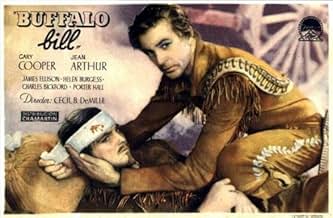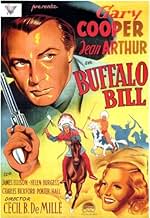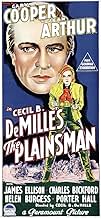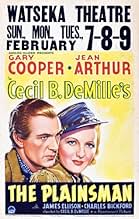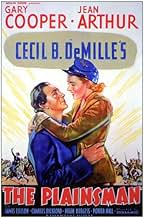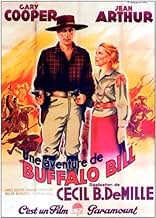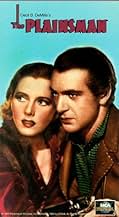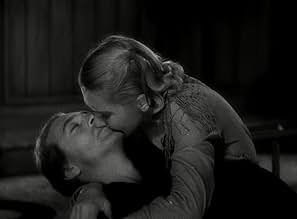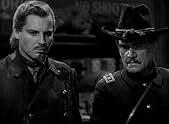NOTE IMDb
6,8/10
2,6 k
MA NOTE
Ajouter une intrigue dans votre langueWild Bill Hickok and Buffalo Bill Cody attempt to stop an Indian uprising that was started by white gun-runners.Wild Bill Hickok and Buffalo Bill Cody attempt to stop an Indian uprising that was started by white gun-runners.Wild Bill Hickok and Buffalo Bill Cody attempt to stop an Indian uprising that was started by white gun-runners.
- Réalisation
- Scénario
- Casting principal
- Récompenses
- 3 victoires au total
Fred Kohler
- Jake - A Teamster
- (as Fred Kohler Sr.)
Pat Moriarity
- Sgt. McGinnis
- (as Pat Moriarty)
Avis à la une
This Cecil B. DeMille epic of the old West contains what may be Jean Arthur's finest performance, as a hysterical, eccentric, incurably amoral, but devotedly doting Calamity Jane. She really pulled it off! Gary Cooper is at his most taciturn, but manages some occasional pithy sayings: 'The plains are big, but trails cross ... sometimes.' The story is a pastiche to end all pastiches. All the cowboy heroes of Western lore seem to be in there somehow except for Jesse James. Even Abraham Lincoln opens the story in person (or at least, DeMille would have us believe so). There is no room for anything so evanescent as subtlety, this is a 'stomp 'em in the face' tale for the masses. A remarkable thing about this film however is that it is a very early full frontal attack on what Eisenhower was eventually to name 'the military industrial complex'. It isn't just a story about gun-runners, but about arming anyone for money, and doing so from the heart of Washington. But let's not get into politics, let's leave that to DeMille, who can be guaranteed to be superficial. The chief interest of this film all these years later is that it uses the first film score composed by George Antheil, who has a lot to say about the job in his autobiography, 'Bad Boy of Music'. Antheil seems to have originated 'the big sound' adopted by all subsequent Westerns, whereby the plains sing out with the voices and sounds of countless cowboys in the sky, celebrating the open spaces and interweaving common melodies. That is why it does not sound at all unusual, because we have heard it a thousand times. But he seems to have been the first to summon up the combined rustlings of all the sage brush into this symphony of the open skies which has entered into American mythic lore, and given it a soundtrack which has never varied since then, corny as it may be, but doubtless appropriate. It is amusing to see Anthony Quinn in an early appearance as a Cheyenne Indian. Gabby Hayes is in there somewhere, but you miss him in the crowd. Gary Cooper overtops them all, looming large, - but when did he ever loom small?
This movie has Wild Bill Hickok, Calamity Jane, Buffalo Bill and General Custer all together. Gary Cooper plays Wild Bill and Jean Arthur plays Calamity Jane and Charles Bickford plays the bad guy who sells weapons to the Indians and you can hardly recognize him. This was the first time Cecil B. DeMille and Gary Cooper worked together and the next movie the made was basically the same but set in a different time. This movie starts out with Lincoln's assassination and it also deals with an Indian war. Calamity Jane is in love with Wild Bill and Buffalo Bill has gotten married and now wants to stay home. This movie also deals with Custer's last stand and is far from accurate. Gary Cooper is good as usual and i usually don't like Jean Arthur but i liked her here.
This Cecil B. DeMille movie has all the trademarks of that director. It's a big and spectacular look at the Old West. Perhaps there's a bit too much emphasis on creating an epic and not enough on telling a good story.
To be clear, I don't mind that it takes so many liberties with historical facts. When I watch a movie I don't necessarily need a history lesson, and I can forgive a movie taking liberties in order to tell a good story.
However, there is little subtlety and emotional weight in the storytelling. In the first half, things happen to move the story along, without necessarily making much sense.
Gary Cooper, not my favorite among the western genre's big stars, is aloof as Wild Bill Hickok. No one can deny his cinematic presence, though. Jean Arthur brings some fun to her role as Calamity Jane. I have seen some reviewers praising her performance, but the problem is, she never seems convincing. Lead actresses of this era were expected to be beautiful, romantic and sensitive, and that's fine when they play a beautiful, romantic and sensitive woman, which is most of the time. But Calamity Jane? Can we buy Jane Arthur as dissolute, unconventional and wild? The script gives her more to do in this movie than most actresses get in westerns of this period, but she still has to spend the movie mooning after a disdainful Gary Cooper to provide the conventional romance.
I feel like I'm being more negative than the movie deserves. It's just the it doesn't always live up to its ambition. Once you accept that you can't take the story too seriously, you can enjoy it as harmless entertainment. In fact, it finds more focus in the second half of the movie, which is quite fine.
To be clear, I don't mind that it takes so many liberties with historical facts. When I watch a movie I don't necessarily need a history lesson, and I can forgive a movie taking liberties in order to tell a good story.
However, there is little subtlety and emotional weight in the storytelling. In the first half, things happen to move the story along, without necessarily making much sense.
Gary Cooper, not my favorite among the western genre's big stars, is aloof as Wild Bill Hickok. No one can deny his cinematic presence, though. Jean Arthur brings some fun to her role as Calamity Jane. I have seen some reviewers praising her performance, but the problem is, she never seems convincing. Lead actresses of this era were expected to be beautiful, romantic and sensitive, and that's fine when they play a beautiful, romantic and sensitive woman, which is most of the time. But Calamity Jane? Can we buy Jane Arthur as dissolute, unconventional and wild? The script gives her more to do in this movie than most actresses get in westerns of this period, but she still has to spend the movie mooning after a disdainful Gary Cooper to provide the conventional romance.
I feel like I'm being more negative than the movie deserves. It's just the it doesn't always live up to its ambition. Once you accept that you can't take the story too seriously, you can enjoy it as harmless entertainment. In fact, it finds more focus in the second half of the movie, which is quite fine.
Conceived and executed with all the brio typical of a De Mille epic - all the 64 pistols used in the film came from his personal collection - 'The Plainsman', for all its attention to petty historical detail (De Mille was insistent that the Phrase 'Go West, Young man' be correctly attributed to John B. Searle, the Editor of The Terra Haute Express) plays fast and loose with history.
Cooper is the austere Hickok, Ellison (a regular in the Hopalong Cassidy series, loaned to De Mille by 'Pops' Sherman)a boyish Buffalo Bill, Arthur a breezy Calamity Jane and Miljan a heroic Custer to whose defence all three come. Bickford is the smooth gun running villain. De Mille's well-practised abilities in handling big budgets, big casts and big stories overcame the doggedly domestic drama of Cooper and Arthur's relationship. Slow moving and overly romantic by modern standards in its depiction of Westward expansion, 'The Plainsman' remains an entertaining spectacle.
In 1966, Universal remade the movie as a vastly inferior telefilm.
Phil Hardy
Cooper is the austere Hickok, Ellison (a regular in the Hopalong Cassidy series, loaned to De Mille by 'Pops' Sherman)a boyish Buffalo Bill, Arthur a breezy Calamity Jane and Miljan a heroic Custer to whose defence all three come. Bickford is the smooth gun running villain. De Mille's well-practised abilities in handling big budgets, big casts and big stories overcame the doggedly domestic drama of Cooper and Arthur's relationship. Slow moving and overly romantic by modern standards in its depiction of Westward expansion, 'The Plainsman' remains an entertaining spectacle.
In 1966, Universal remade the movie as a vastly inferior telefilm.
Phil Hardy
The master of movie spectacle Cecil B. De Mille goes West. Using three legends of the old west as its protagonists (they probably never met),Gary Cooper is portraying Wild Bill Hickock,James Ellison as Buffalo Bill and Jean Arthur does make a nice Calamity Jane. The story serves only for De Mille to hang some marvelous action sequences on, like the big Indian attack.Scenes like that are extremely well done.If you don't mind the somewhat over-the-top performances of the cast this is an very entertaining western.Look out for a very young Anthony Quinn essaying the role of an Indian brave who participated at the battle of Little Big Horn.This part got him at least noticed in Hollywood.
Le saviez-vous
- AnecdotesJohn Wayne very much wanted the role of Wild Bill Hickok, which he felt certain would make him a star, but director Cecil B. DeMille wanted Gary Cooper instead.
- GaffesOn the evening of Lincoln's assassination Van Ellyn and his associates are discussing the supposedly then current John Soule editorial, "Go West, Young Man." Lincoln was murdered in 1865. Soule wrote that famous line in 1851.
- Citations
Calamity Jane: Tip your hat when you speak to a lady!
Wild Bill Hickok: I will... when I speak to a lady.
- Versions alternativesThe UK DVD is cut by 2 secs to remove a horsefall.
- ConnexionsFeatured in The Hollywood Collection: Anthony Quinn an Original (1990)
- Bandes originalesWhen Johnny Comes Marching Home
(1863) (uncredited)
Written by Louis Lambert
Played as background music for the first scene, Washington, D.C.
Meilleurs choix
Connectez-vous pour évaluer et suivre la liste de favoris afin de recevoir des recommandations personnalisées
- How long is The Plainsman?Alimenté par Alexa
Détails
Box-office
- Budget
- 1 000 000 $US (estimé)
- Durée
- 1h 53min(113 min)
- Couleur
- Rapport de forme
- 1.37 : 1
Contribuer à cette page
Suggérer une modification ou ajouter du contenu manquant


